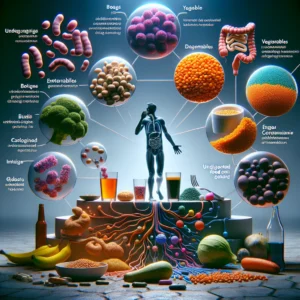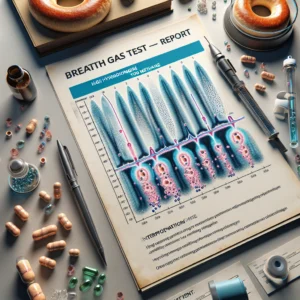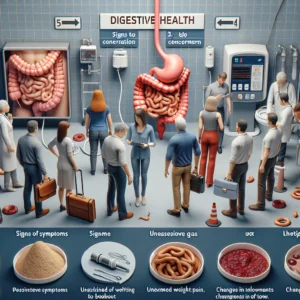Boost Your Digestive Health: How Breath Gas Chromatography Can Relieve Bloating Symptoms
Bloating is a common and often uncomfortable issue affecting a wide range of people, regardless of age or background. This condition typically presents itself as a feeling of excessive fullness and swelling in the abdomen, which can be accompanied by various unpleasant symptoms, such as abdominal pain, general discomfort, and even social anxiety. While occasional bloating can be attributed to specific dietary choices or eating patterns, persistent or severe cases may indicate an underlying digestive issue that necessitates professional assessment. Understanding the intricate factors contributing to bloating is crucial for effectively alleviating its symptoms and promoting lasting digestive wellness.
Identifying the underlying causes of bloating is essential for achieving relief from discomfort. Breath gas testing has emerged as a revolutionary diagnostic method in gastrointestinal health, offering a non-invasive way for healthcare professionals to analyze the gases present in a person’s breath. This advanced analytical technique provides valuable insights into digestive functions and can help uncover potential troubles that may contribute to bloating, thereby guiding effective treatment strategies.
Breath gas chromatography is instrumental in detecting imbalances in the gut microbiome and diagnosing disorders like small intestinal bacterial overgrowth (SIBO). By examining specific gases such as hydrogen and methane, this innovative approach not only aids in identifying the root causes of bloating but also supports the creation of tailored treatment plans aimed at alleviating discomfort and enhancing overall gut health.
Effective Strategies for Managing Bloating and Excess Gas
- Bloating and excessive gas can significantly disrupt your daily routine, affecting both physical comfort and emotional well-being.
- Common factors contributing to bloating and gas include certain dietary habits, underlying medical conditions, and various lifestyle choices.
- Utilizing breath gas testing is a non-invasive method to detect specific gases present in breath samples.
- Interpreting breath gas test results can help identify conditions such as lactose intolerance and SIBO.
- Effective management strategies for bloating and excess gas may include dietary changes, medications, and lifestyle adjustments.
 Identifying Key Causes of Bloating and Excess Gas for Effective Management
Identifying Key Causes of Bloating and Excess Gas for Effective Management
The sensations of bloating and excessive gas often arise from various underlying factors, making it imperative to pinpoint these triggers for effective management. A frequent cause is dietary habits, especially the intake of foods rich in fiber or fermentable carbohydrates, which can lead to increased gas production during digestion. Recognizing these contributing elements is the essential first step toward alleviating bloating symptoms.
For instance, foods such as beans, lentils, cruciferous vegetables, and carbonated beverages can trigger bloating sensations. Furthermore, habits like eating too rapidly or consuming large meals may worsen bloating due to the excess air swallowed, which intensifies discomfort. The condition of your gut microbiome is another crucial factor influencing bloating.
An imbalance in the diversity and quantity of bacteria in your intestines can disrupt normal digestive functions. For example, an excess of bacteria in the small intestine may ferment undigested food, resulting in gas production. This scenario, known as SIBO, can lead to chronic bloating and significant discomfort. Additionally, heightened stress and anxiety levels can exacerbate bloating symptoms, disrupting digestive processes and impeding gut motility.
Comprehensive Diagnostic Approaches for Chronic Bloating and Excess Gas
When bloating and excessive gas turn into ongoing concerns, it is vital to implement a thorough diagnostic strategy to identify the root cause. Your healthcare provider will likely start with a comprehensive medical history and physical examination to evaluate your symptoms alongside any contributing factors. They may ask about your eating habits, lifestyle choices, and other symptoms you might be experiencing to gain a complete picture of your health.
This in-depth assessment assists in narrowing down potential causes and determining the most suitable diagnostic tests. Besides a detailed history and physical examination, various diagnostic techniques may be employed to investigate the sources of your bloating. Blood tests can help exclude conditions such as celiac disease or infections, while imaging studies like ultrasounds or CT scans can detect structural irregularities within the gastrointestinal tract.
Breath gas testing is increasingly acknowledged as a valuable method for diagnosing specific conditions like SIBO, allowing for a more targeted and effective approach to the treatment and management of digestive disorders.
The Transformative Role of Breath Gas Testing in Diagnosing Digestive Disorders
Breath gas testing, primarily utilizing Breath Gas Chromatography, has significantly changed the diagnostic landscape for healthcare providers dealing with digestive disorders related to bloating. This non-invasive process usually involves consuming a specific substrate—most commonly lactulose or glucose—followed by the systematic collection of breath samples at specified intervals. As the substrate moves through the digestive system, it undergoes fermentation by any excess bacteria present.
The resulting gases, chiefly hydrogen and methane, are measured from the collected breath samples. The scientific basis of breath gas testing lies in its capability to detect abnormal levels of these gases, which may indicate bacterial overgrowth or premature fermentation in the small intestine. For example, if SIBO is present, bacteria in the small intestine ferment the substrate too soon, leading to increased levels of hydrogen or methane in the breath samples.
This methodology not only provides essential diagnostic data but also informs treatment strategies tailored specifically to your unique digestive condition.
 Interpreting Breath Gas Test Outcomes for Personalized Treatment Plans
Interpreting Breath Gas Test Outcomes for Personalized Treatment Plans
Understanding breath gas test results requires a comprehensive grasp of the implications of hydrogen and methane levels concerning your digestive health. Elevated hydrogen levels generally indicate an overgrowth of bacteria in the small intestine that ferments carbohydrates prematurely during digestion. Conversely, high methane levels may suggest a different type of bacterial overgrowth that leads to constipation and related gastrointestinal problems.
Your healthcare provider will evaluate the timing and intensity of gas production in relation to substrate ingestion. A rapid spike in hydrogen or methane levels shortly after consumption can confirm a diagnosis of SIBO or associated disorders. Grasping these results is crucial for developing an effective treatment strategy that addresses both the symptoms of bloating and the underlying causes of your discomfort.
Customizing Treatment Approaches for Bloating and Excess Gas
Once breath gas testing or other diagnostic methods have confirmed a diagnosis, treatment options for bloating and excessive gas can be tailored to meet your specific needs. If SIBO is identified as the primary culprit, your healthcare provider may prescribe antibiotics to combat the bacterial overgrowth in your small intestine. Rifaximin is a commonly prescribed antibiotic that targets harmful bacteria without significantly disturbing the gut microbiome.
Additionally, dietary changes can play a vital role in managing bloating and excessive gas alongside antibiotic treatment. Adopting a low-FODMAP diet can help alleviate symptoms by limiting the intake of certain fermentable carbohydrates that worsen bloating. Furthermore, probiotics may be suggested to restore balance in your gut microbiome, thereby improving overall digestive health.
Your healthcare provider will collaborate with you to create a comprehensive treatment plan that addresses immediate symptoms while fostering long-term gut health and overall well-being.
Implementing Lifestyle Adjustments for Effective Bloating and Gas Management
Making lifestyle adjustments can significantly enhance your ability to manage bloating and excessive gas effectively. One key approach is to adopt mindful eating practices. By slowing down during meals, adequately chewing your food, and minimizing distractions, you can reduce the amount of air swallowed and help decrease gas production.
Additionally, consider transitioning to smaller, more frequent meals instead of consuming large portions that may overwhelm your digestive system. Regular physical activity is another essential component of effective bloating management. Engaging in moderate exercise can stimulate healthy digestion and relieve feelings of fullness or discomfort.
Activities such as walking, yoga, or swimming can encourage gut motility and help alleviate bloating symptoms. Staying properly hydrated is equally important; drinking sufficient water throughout the day supports digestion and helps prevent constipation, which can worsen bloating.
 Recognizing When to Consult a Healthcare Professional for Bloating and Excess Gas
Recognizing When to Consult a Healthcare Professional for Bloating and Excess Gas
While occasional occurrences of bloating and excessive gas are commonplace, certain situations require prompt medical attention. If you notice that your symptoms are persistent or worsening over time, it is crucial to seek guidance from a healthcare professional for further assessment. Additionally, if you experience severe abdominal pain, unexplained weight loss, changes in bowel habits, or blood in your stool, these symptoms may signal more serious underlying conditions that demand urgent care.
Taking proactive steps regarding your digestive health is vital for maintaining overall wellness. By understanding the potential causes of bloating and utilizing diagnostic tools like breath gas testing, you can take control of your health journey. Successful management often involves a combination of medical intervention, dietary adjustments, and lifestyle changes tailored to your individual needs.
Do not hesitate to seek assistance when necessary; addressing these issues early can significantly improve your quality of life and provide greater comfort in daily activities.
If you’re interested in alternative therapies for weight management, consider exploring acupuncture. A recent article on mcrtherapies.co.uk highlights acupuncture as an effective method for individuals aiming to achieve their weight loss goals. By targeting specific points in the body, acupuncture can help regulate metabolism, reduce cravings, and enhance digestion. This holistic approach may be particularly beneficial for those dealing with bloating and other digestive challenges.
Common Inquiries Regarding Bloating and Gas Management
What exactly is bloating, and what factors contribute to it?
Bloating is defined by a feeling of fullness or tightness in the abdomen, often accompanied by visible swelling or distention. Various elements, such as gas accumulation, fluid retention, and digestive complications, can lead to this uncomfortable sensation.
How is breath gas testing conducted?
Breath gas testing is a non-invasive diagnostic method that measures specific gases in a person’s breath. This evaluation can help identify gastrointestinal disorders, including Small Intestinal Bacterial Overgrowth (SIBO) and lactose intolerance.
What does the breath gas testing procedure involve?
During breath gas testing, the participant exhales into a specialized device that collects and analyzes their breath. The levels of hydrogen, methane, and other gases, which may indicate specific digestive issues, are then measured and assessed.
Which conditions can be identified through breath gas testing?
Breath gas testing can assist in diagnosing conditions such as SIBO, lactose intolerance, fructose malabsorption, and several other gastrointestinal disorders that may contribute to bloating and discomfort.
What are the benefits of breath gas testing?
Breath gas testing is non-invasive and generally easy to perform. It offers valuable insights into an individual’s digestive health and aids healthcare providers in creating personalized treatment plans to address specific gastrointestinal issues.
Are there any risks or side effects linked to breath gas testing?
Breath gas testing is regarded as safe and is typically well-tolerated. Some individuals may experience mild discomfort or dizziness from repeated breath sampling, but serious side effects are uncommon. It is essential to follow any pre-test instructions given by your healthcare professional.
Presented By: Bloating Treatment
The Article: Bloating and Breath Gas Testing: An Effective Diagnostic Method appeared first on https://mcrtherapies.co.uk
The Article Bloating and Breath Gas Testing for Accurate Diagnosis appeared first on https://mcrtherapies.com
The Article Bloating and Breath Gas Testing for Accurate Diagnosis Solutions Was Found On https://limitsofstrategy.com
References:
Bloating and Breath Gas Testing for Accurate Diagnosis Solutions



